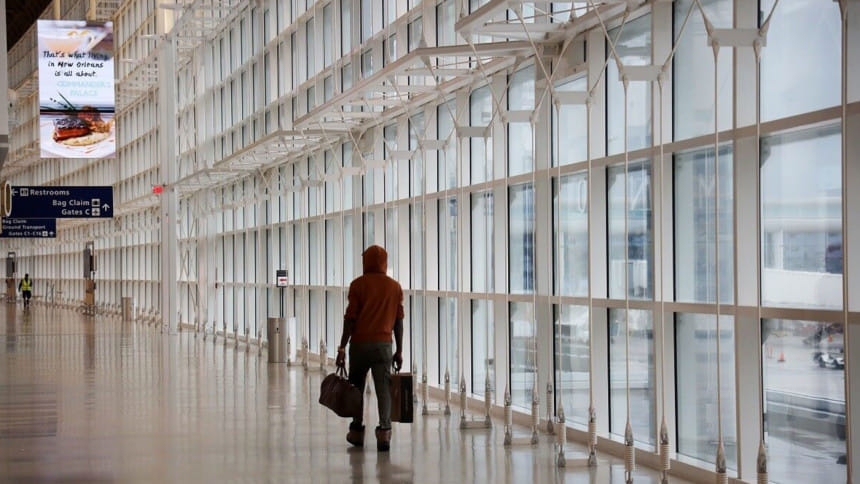A severe blow to foreign students

Bangladeshi students pursuing higher education in the United States face uncertainty over their future due to a new policy of the US administration on not allowing foreign students in the aftermath of Covid-19.
On Monday, the US Immigration and Customs Enforcement (ICE) in a statement said it would not allow foreign students to remain in the country if the courses they take this fall were entirely online.
ICE said the decision came as an effort to reduce coronavirus transmission in the country.
Talking to The Daily Star, several Bangladeshi students studying at different colleges and universities in the US called the decision "inhumane, demeaning and mindless."
"The decision is nothing but inhumane and cruel to international students studying in the US," said Nuhan B Abid, a student at Dickinson College.
He said he was still waiting for further instructions from his university about how the ruling specifically affects them.
Since his university is conducting in-person classes for the fall semester, he is not directly affected. "However, this would still depend on my course load, as some of my classes might still be remote," he said.
The ICE in the statement said, "Nonimmigrant F-1 and M-1 students attending schools operating entirely online may not take a full online course load and remain in the United States."
"Active students currently in the United States enrolled in such programs must depart the country or take other measures, such as transferring to a school with in-person instruction to remain in lawful status," it said.
"If not, they may face immigration consequences including, but not limited to, the initiation of removal proceedings," it said.
The new policy came at a time when the number of Bangladeshi students is growing fast in the US.
According to the 2019 Open Doors Report on International Educational Exchange, the number of students from Bangladesh studying in the United States stood at 8,249 during the most recent academic year (2018/2019).
This is an all-time high for Bangladesh, reflecting a 10 percent increase over the 2018 report and more than tripling since 2009.
Bangladesh now ranks 20th in the world in terms of sending students to the US for higher education.
The increase in the number of Bangladeshi students is highest in the South Asian region. Out of total 8,249 Bangladeshi students studying in the US, 5,278 study at the graduate level, a 13.5 percent increase over 2017/2018 academic year.
"A MINDLESS NEW POLICY"
Nuhan said based on the recent instructions imposed by the ICE, international students risk being deported if universities conduct all courses online this fall.
"This means we will either have to leave the USA or transfer to a school that is conducting in-person classes," he said.
Now, since many students chose to go home due to the pandemic, they will be asked to risk their health and fly back. And if the student is in a country with travel restrictions, he/she may even have trouble coming back for in-person classes, risking visa status, he feared.
My international peers are scrambling to find expensive flights on short notice, knowing they'll have to actively risk an in-person semester or risk losing the education they worked so hard for.
"None of this is fair to us and with how the F-1 visa works, we can't do much to advocate for our rights and have to rely on our domestic peers and administration to step up for us to force a change", he added.
Nuren Iftekhar, a graduate student of chemistry at Virginia Tech said that being thousands of miles away from the country to pursue higher studies can be stressful for many reasons.
"But I honestly didn't think I'd have to wake up one day and be threatened with the prospect of being evacuated for a mindless new policy," he said.
"The fact that a decision like this would be taken against a large number of students is inhumane. We are once again being a victim of an asinine bureaucratic move that berates our hard work", he added.
The likely scenario is that the university authority would be unwillingly reopening their class putting the lives of students at risk. "Meanwhile on a personal level I'm now living under the constant worry of having to abandon my research that I've been working on for the past year and be forced out of the country, not knowing if I'd even be able to come back again," Nuren added.
He said the university and the professors are just as troubled by the situation. Their research is driven by a large participation from the international students.
"To say that the directive has been infuriating and even demeaning is an understatement", Prionti Dipita Nasir a student of Rochester Institute of Technology said.
Many of her friends at colleges that have chosen to be fully online are preparing to take leaves of absence, while still trying to push their respective college authorities to find suitable workarounds.
Too many of them are financially drained already, and so flying back home will be a difficult undertaking. "We are signing petitions to the government with the hope that it might miraculously end up reaching and swaying them", she said.
"Until the directive was declared, I was frowning at my college's decision to adopt a hybrid model -- one that will mix a high percentage of in-person classes with online offerings. This has proved to be a blessing in disguise because I, like other international students in my college, can remain in the country and continue my studies".
"But this is entirely conditional. If fully online instruction becomes necessary at any point, the directive will have serious implications for us," she said.

 For all latest news, follow The Daily Star's Google News channel.
For all latest news, follow The Daily Star's Google News channel. 




Comments